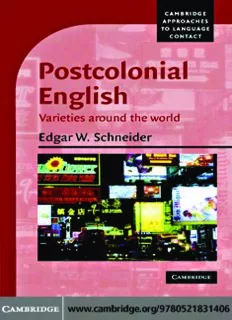
Postcolonial English: Varieties around the world (Cambridge Approaches to Language Contact) PDF
Preview Postcolonial English: Varieties around the world (Cambridge Approaches to Language Contact)
This page intentionally left blank Postcolonial English TheglobalspreadofEnglishhasresultedintheemergenceofadiverse range of postcolonial varieties around the world. Postcolonial English providesaclearandoriginalaccountoftheevolutionofthesevarieties, exploringthehistorical,social,andecologicalfactorsthathaveshapedall levelsoftheirstructure.ItarguesthatwhiletheseEnglisheshavedevel- opednewanduniquepropertieswhichdiffergreatlyfromonelocationto another, their spread and diversification can in fact be explained by a singleunderlyingprocess,whichbuildsupontheconstantrelationships and communication needs of the colonizers, the colonized, and other parties.Outliningthestagesandcharacteristicsofthisprocess,itapplies them in detail to English in sixteen different countries across all conti- nentsaswellas,inaseparatechapter,toahistoryofAmericanEnglish. Ofkeyinteresttosociolinguists,dialectologists,historicallinguists,and syntacticians alike, this book provides a fascinating new picture of the growthandevolutionofEnglisharoundtheglobe. EDGAR W. SCHNEIDER isProfessorandChairofEnglishLinguistics in the Department of English and American Studies, University of Regensburg.HismostrecentbooksincludeDegreesofRestructuringin CreoleLanguages(2000),andAHandbookofVarietiesofEnglish(2004). CambridgeApproachestoLanguageContact GeneralEditor SalikokoS.Mufwene,UniversityofChicago EditorialBoard RobertChaudenson,Universite´ d’Aix-en-Provence BrajKachru,UniversityofIllinoisatUrbana RajendMesthrie,UniversityofCapeTown LesleyMilroy,UniversityofMichigan ShanaPoplack,UniversityofOttawa MichaelSilverstein,UniversityofChicago Cambridge Approaches to Language Contact is an interdisciplinary seriesbringingtogetherworkonlanguagecontactfromadiverserange ofresearchareas.Theseriesfocusesonkeytopicsinthestudyofcontact betweenlanguagesordialects,includingthedevelopmentofpidginsand creoles,languageevolutionandchange,worldEnglishes,code-switching andcode-mixing,bilingualismandsecond-languageacquisition,borrow- ing,interference,andconvergencephenomena. Publishedtitles SalikokoMufwene,TheEcologyofLanguageEvolution MichaelClyne,TheDynamicsofLanguageContact BerndHeineandTaniaKuteva,LanguageContactandGrammaticalChange Furthertitlesplannedfortheseries GuyBaileyandPatriciaCukor-Avila,TheDevelopmentofAfrican-American English MaartenMous,ControllingLanguage ClancyClements,TheLinguisticLegacyofSpanishandPortuguese Postcolonial English Varieties around the world Edgar W. Schneider UniversityofRegensburg CAMBRIDGEUNIVERSITYPRESS Cambridge, New York, Melbourne, Madrid, Cape Town, Singapore, São Paulo Cambridge University Press The Edinburgh Building, Cambridge CB28RU, UK Published in the United States of America by Cambridge University Press, New York www.cambridge.org Information on this title: www.cambridge.org/9780521831406 © Edgar W. Schneider 2007 This publication is in copyright. Subject to statutory exception and to the provision of relevant collective licensing agreements, no reproduction of any part may take place without the written permission of Cambridge University Press. First published in print format 2007 ISBN-13 978-0-511-28517-2 eBook (EBL) ISBN-10 0-511-28517-5 eBook (EBL) ISBN-13 978-0-521-83140-6 hardback ISBN-10 0-521-83140-7 hardback ISBN-13 978-0-521-53901-2 paperback ISBN-10 0-521-53901-3 paperback Cambridge University Press has no responsibility for the persistence or accuracy of urls for external or third-party internet websites referred to in this publication, and does not guarantee that any content on such websites is, or will remain, accurate or appropriate. Contents Listofmaps,figures,andtables pageix Serieseditor’sforeword xi Prefaceandacknowledgments xiii Listofabbreviations xvi 1 Introduction 1 2 Chartingtheterritory:PostcolonialEnglishesasafield oflinguisticinvestigation 8 2.1 Ancestry 8 2.2 Approaches 11 2.3 Alternativeperspectivesandissues 17 3 TheevolutionofPostcolonialEnglishes:theDynamicModel 21 3.1 Transformingselvesinmigration:theoreticalbackground 21 3.2 TheDynamicModeloftheevolutionofPostcolonialEnglishes 29 3.3 Variationsonthebasicpattern 55 3.4 Widerapplicability 68 4 Linguisticaspectsofnativization 71 4.1 Structuralnativization:characteristicfeatures 72 4.2 Tracingstructuralnativization:methodologicalandconceptualissues 90 4.3 Theroadtonativization:linguisticprocesses 97 5 Countriesalongthecycle:casestudies 113 5.1 Fiji 114 5.2 Australia 118 5.3 NewZealand 127 5.4 HongKong 133 5.5 ThePhilippines 140 5.6 Malaysia 144 5.7 Singapore 153 5.8 India 161 5.9 SouthAfrica 173 vii viii Listofcontents 5.10 Kenya 189 5.11 Tanzania 197 5.12 Nigeria 199 5.13 Cameroon 212 5.14 Barbados 219 5.15 Jamaica 227 5.16 Canada 238 6 Thecycleinhindsight:theemergenceof AmericanEnglish 251 6.1 ‘‘AssembledinAmericafromvariousquarters’’:Phase1 (ca.1587–1670) 254 6.2 ‘‘Englishwithgreatclassicalpurity’’:Phase2(ca.1670–1773) 264 6.3 ‘‘Thattorrentofbarbarousphraseology’’:Phase3 (ca.1773–1828/1848) 273 6.4 ‘‘Ourhonorrequiresustohaveasystemofourown’’:Phase4 (1828/1848–1898) 282 6.5 ‘‘Weknowjustwhowearebyourlanguage’’:Phase5(1898–) 291 6.6 Summaryandoutlook 307 7 Conclusion 309 Notes 318 References 331 Indexofauthors 360 Indexofsubjects 363
